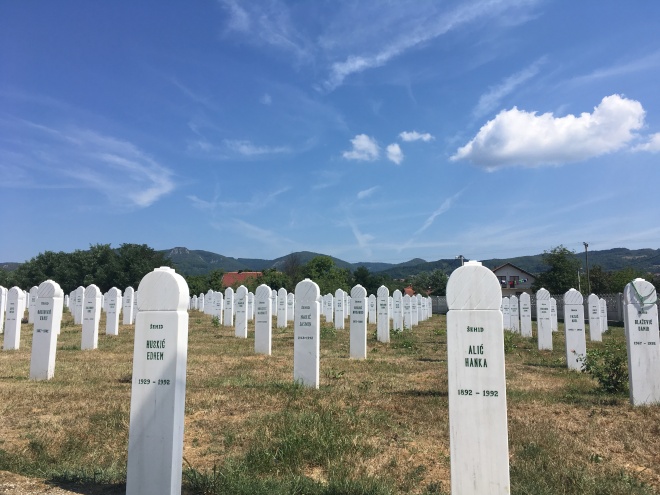
When talking about war, it is often the numbers that are recited. How many thousands died here; how many hundreds were buried there; how many were tortured or raped or shot so close to your own home. But it is always the human stories that stick. It is the individual lives that wander round the mind and sit heavily in the corner of the brain.
Bosnians talk about the war daily. It is part of what makes the wound in this country so visceral. The land is divided, the politics are complex and the memory of war runs through its veins.
On our second day exploring conflict and peacebuilding in Prijedor, in the Republic of Srpska, we visited several war memorials and the site of a mass grave.
Unidentified bodies were piled on top of each other in mass graves, accounting for some part of the huge number of missing people from the war between 1992-1995. DNA tests are used to identify the corpses with samples taken from family members to search for matches. Gradually the science helps identify and reduce the numbers of the missing.
After the discovery of a mass grave in 2014, and the subsequent DNA tests, the number for Prijedor’s missing went down significantly. It is still estimated that there are hundreds more.
Sitting in a little spot of shade by the Kamicani graveyard, founder of Most Mira, Kemal Pervanic, told us a story of a father. This man’s son was taken during the 1992 siege on Prijedor. When asked for his blood sample to identify his son’s body, he refused.
This father—just because a child is taken away does not rid a father of his role—is fighting both an intensely personal and highly political battle.
If he were to provide a DNA sample to be tested, it may aid this national initiative to identify all of the war dead. It might nudge down the number of the missing from the town. One less uncertainty.
But doing so would mean for this father’s son to be taken from him a second time. It would be one statistic passed over to another—shifted from the number of missing to the number of dead. For a father who cannot bear the certainty of knowing whether his son is alive or not, I can imagine he would need the hope that comes from not knowing.
Wounds fade with time, but Prijedor is far from healed and this father’s pain is still raw. I wonder if giving his blood sample and learning the truth, no matter how painful, would provide a thin layer of protection for him, or whether it would rip the skin off indefinitely.
In Prijedor, everyone you talk to has personal experience of the war. Everyone has a story like this father. As a participant of the Project on Peacebuilding, we have the privilege of hearing the personal and the history, and standing on the site where that history took place.
I spent an eye-opening week exploring post-conflict politics in Bosnia with Most Mira. Original post here.